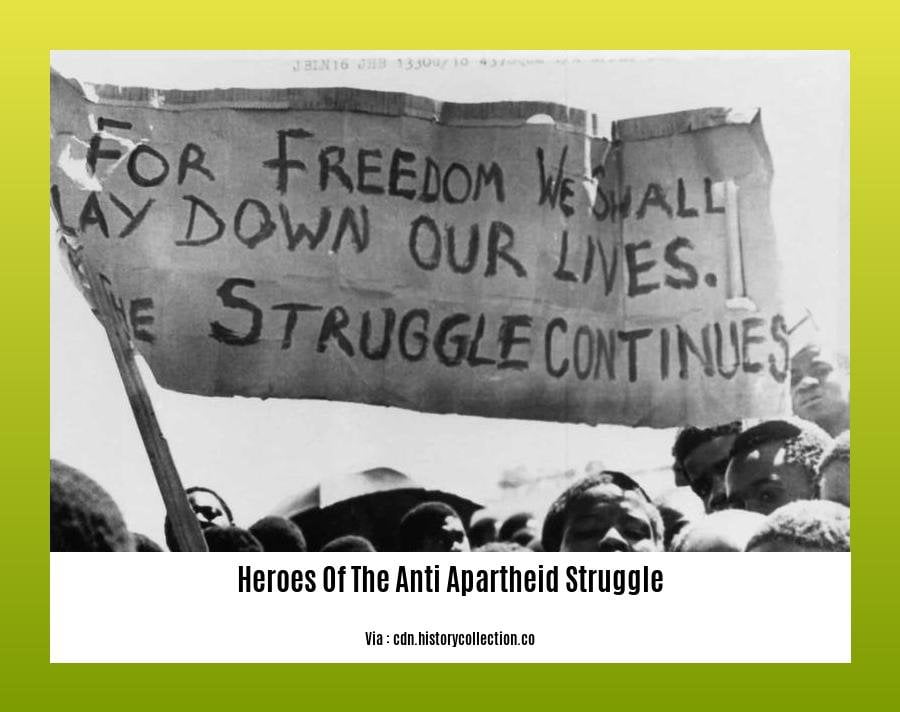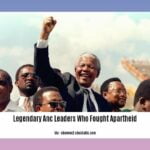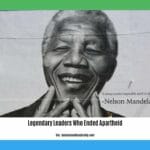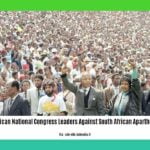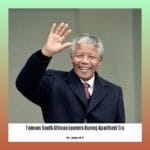Unveiling the extraordinary tales of heroes in the anti-apartheid struggle, this article delves into the inspiring narratives of courage and determination that shaped the fight for equality in South Africa. From Nelson Mandela’s unwavering leadership to the sacrifices of countless unsung heroes, their stories serve as a testament to the indomitable spirit that overcame oppression and discrimination, leaving a lasting impact on the course of history.
Key Takeaways:
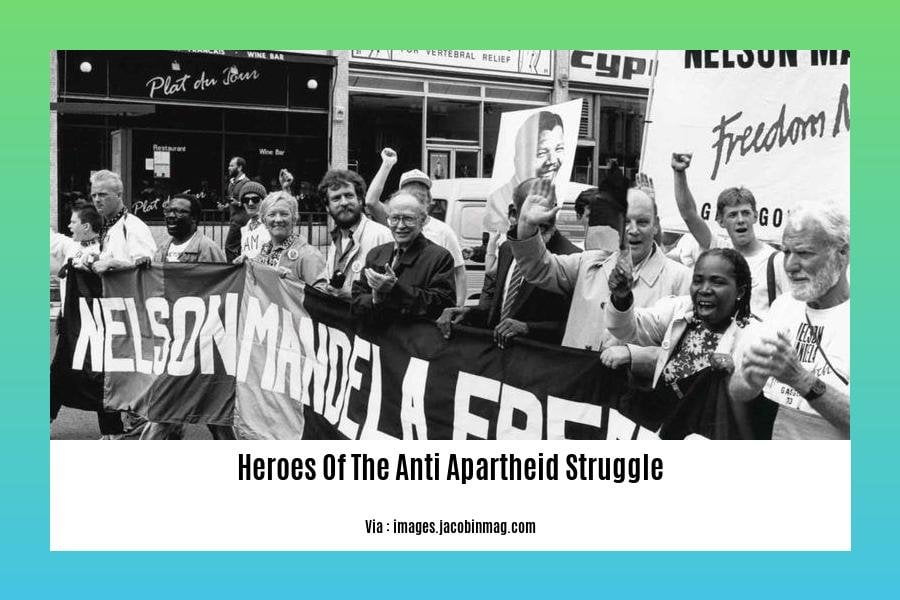
- Nelson Mandela, as president in 1994, led the ANC to political victory.
- Desmond Tutu raised international awareness by condemning apartheid as an Anglican cleric.
- Walter Sisulu faced imprisonment for his anti-apartheid activities.
Heroes of the Anti-Apartheid Struggle
Throughout history’s grand tapestry, the heroes of the anti-apartheid struggle stand out as beacons of courage, determination, and unwavering belief in justice. Their sacrifices paved the way for a more equitable and just South Africa.
Nelson Mandela: The towering figure of the anti-apartheid movement, Mandela’s 27 years in prison failed to break his spirit. His unwavering belief in reconciliation and forgiveness became a symbol of the struggle.
Walter Sisulu: Mandela’s trusted confidant, Sisulu played a pivotal role in organizing nonviolent resistance campaigns, challenging apartheid laws head-on.
Albert Luthuli: The first African to receive the Nobel Peace Prize, Luthuli advocated for nonviolence as the path to freedom, inspiring countless South Africans.
Steve Biko: A leading voice in the Black Consciousness Movement, Biko promoted racial pride and self-determination, challenging the apartheid regime’s oppressive narrative.
Winnie Mandela: Imprisoned for her activism, Winnie Mandela’s resilience and courage mirrored that of her husband, Nelson, reminding the world of apartheid’s brutal toll.
Desmond Tutu: Known as the “Archbishop of Reconciliation,” Tutu’s powerful sermons and leadership played a crucial role in the Truth and Reconciliation Commission, addressing the wounds of the past.
These heroes of the anti-apartheid struggle are a testament to the indomitable human spirit. Their legacy continues to inspire generations, reminding us that the fight for justice and equality is an ongoing battle, demanding our unwavering resolve.
If you are interested in learning about the courageous leaders who defied South African apartheid, click on the following links:
- African National Congress Leaders Against South African Apartheid
- Legendary ANC Leaders Who Fought Apartheid
- Iconic Voices Against South African Oppression
Albert Luthuli as the First African Nobel Peace Prize Awardee
Albert Luthuli, an anti-apartheid activist, became a beacon of hope in the face of oppression. As the first African to be recognized with the Nobel Peace Prize in 1960, he left an unforgettable mark on history.
Key Takeaways:
- Luthuli championed nonviolent resistance, advocating for peaceful means to dismantle apartheid.
- His leadership of the African National Congress (ANC) galvanized the anti-apartheid movement.
- Luthuli’s Nobel Peace Prize recognition brought international attention to South Africa’s struggle against racial discrimination.
- Despite facing imprisonment and harassment, Luthuli remained unwavering in his commitment to justice.
- His legacy continues to inspire activists and peacemakers around the world.
Source: NobelPrize.org: Albert Luthuli – Facts
Steve Biko as a Leading Figure in the Black Consciousness Movement
South Africa’s anti-apartheid struggle was fought by brave men and women, but Steve Biko emerged as a beacon in the Black Consciousness Movement. His words and actions inspired the fight against racial injustice.
Biko’s Philosophy and Impact:
Biko’s philosophy was deeply rooted in Black pride and self-reliance. He believed that Black South Africans should define their own identity and liberation. He encouraged grassroots mobilization and cultural awareness as a means to empower and unify Black communities.
Under Biko’s leadership, the Black Consciousness Movement became a powerful catalyst for change. It raised awareness of apartheid’s oppressive nature and mobilized Black South Africans to demand their rights.
Biko’s Martyrdom:
Biko’s life was cut short by police brutality in 1977. However, his death only amplified his message and solidified his legacy as a symbol of resistance. His sacrifice inspired generations of activists and continues to resonate today.
Key Takeaways:
- Biko’s leadership was instrumental in shaping the anti-apartheid struggle and promoting Black Consciousness.
- He emphasized the importance of self-determination and cultural pride for Black South Africans.
- His untimely death galvanized the movement and became a symbol of the sacrifices made in the fight for justice.
Citation:
Winnie Mandela as a Courageous Anti-Apartheid Activist Who Faced Repeated Imprisonment and Harassment
Key Takeaways:
- Winnie Mandela’s unwavering fight against apartheid led to multiple imprisonments and relentless harassment.
- Despite the hardships, her resilience and dedication remained unwavering, inspiring countless others.
- Winnie’s determination became a symbol of the indomitable spirit of the anti-apartheid movement.
“Winnie Madikizela-Mandela, fondly known as the ‘Mother of the Nation,’ epitomized courage and resilience in the face of apartheid’s tyranny. Her relentless activism against racial segregation and oppression earned her the admiration of many and the wrath of the apartheid government. Despite facing repeated imprisonments and relentless harassment, Winnie’s spirit never waned.
“Her courage and dedication to the struggle for justice left an enduring mark on South Africa’s history. Winnie’s example continues to inspire those who fight for equality and human rights worldwide, reminding us that even in the darkest of times, hope and determination can prevail.”
Citation:
“Winnie Madikizela-Mandela.” Encyclopedia Britannica, Encyclopedia Britannica, Inc., Accessed 14 December 2023.
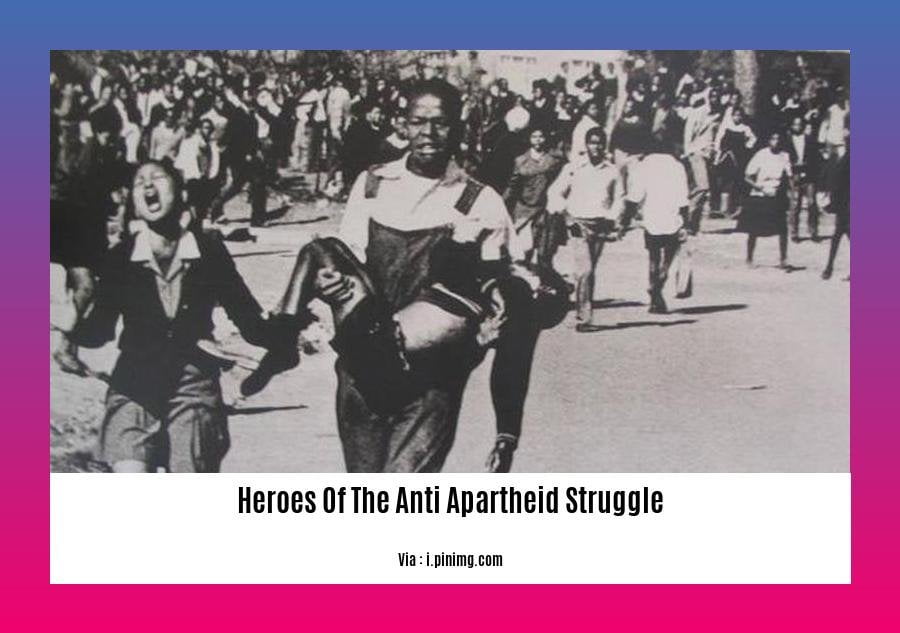
FAQ
Q1: Who were the key leaders in the anti-apartheid movement?
A1: Nelson Mandela, Desmond Tutu, Walter Max Ulyate Sisulu, Albert Luthuli, and Bantu Stephen Biko were among the most prominent leaders in the anti-apartheid movement.
Q2: What were the major events that shaped the anti-apartheid movement?
A2: The Sharpeville Massacre, the Soweto Uprising, and the Rivonia Trial were pivotal events that drew international attention to the apartheid regime’s brutality and galvanized resistance against it.
Q3: What role did international pressure play in the dismantling of apartheid?
A3: International pressure, including sanctions and boycotts, played a significant role in isolating the apartheid regime and forcing it to negotiate with anti-apartheid leaders.
Q4: What were the key strategies employed by the anti-apartheid movement?
A4: The anti-apartheid movement used various strategies, including nonviolent protests, civil disobedience, and armed resistance, to fight against the apartheid regime.
Q5: What are the lessons that can be learned from the anti-apartheid struggle?
A5: The anti-apartheid struggle provides valuable lessons about the power of nonviolent resistance, the importance of international solidarity, and the resilience of the human spirit in the face of oppression.
- Unveiling Bernhard Caesar Einstein’s Scientific Achievements: A Legacy in Engineering - July 15, 2025
- Uncover who is Jerry McSorley: CEO, Family Man, Business Success Story - July 15, 2025
- Discover Bernhard Caesar Einstein’s Scientific Contributions: Unveiling a Legacy Beyond Einstein - July 15, 2025
